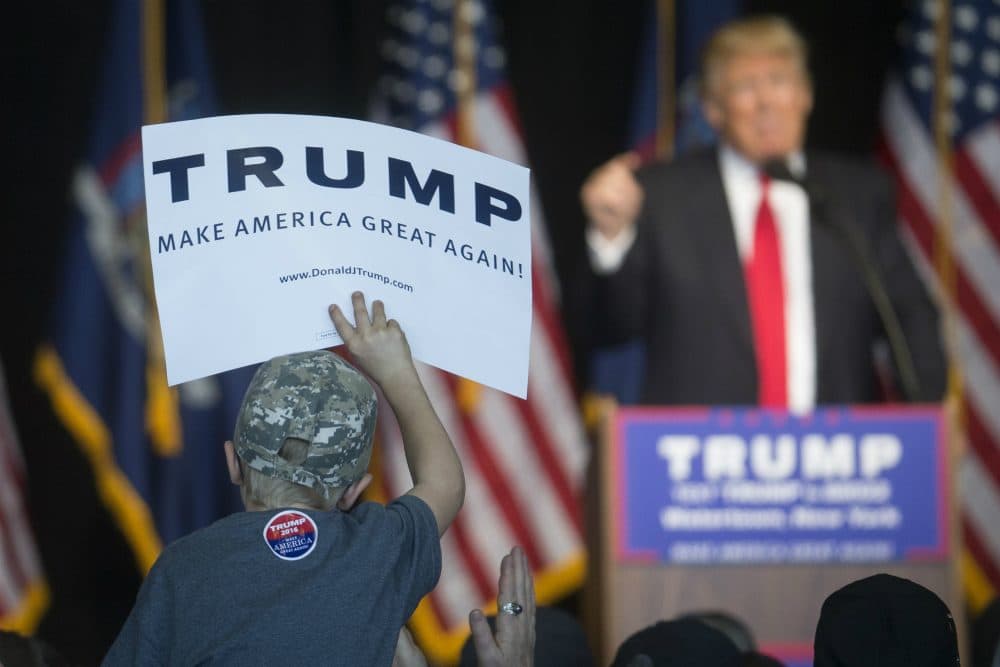Advertisement
Teaching Trump: Rethinking Civic Education In Turbulent Times

With the election season in full swing and a new school year approaching, educators will soon confront a difficult question: Should we share our own political views with students? As a current high school and former middle school teacher, my answer to this question has always been informed by own experiences as a student. Taught by left-leaning teachers and professors in New England who often made demeaning comments about conservatives, I vowed to never insert my opinions when discussing current affairs in my classes.
But the ascendancy of Donald Trump during this presidential campaign has challenged this commitment. Trump’s vitriolic rhetoric, and his history of demonizing marginalized groups, obligates teachers to reconsider their beliefs about how to approach civic education.
The overtly racist and xenophobic statements that Trump has made throughout his campaign should compel educators to speak up and denounce the remarks. From Trump’s insinuation that the Mexican government is sending rapists into the U.S. to his implicit endorsement of a physical assault on a Black Lives Matter protester, Trump has repeatedly disparaged racial and ethnic groups. Recently Trump insulted the Muslim parents of a fallen U.S. soldier by suggesting that the soldier’s mother “wasn’t allowed” to speak at a speech during the Democratic National Convention. By refraining from expressing to students any criticism of these comments, and the many more like them, teachers implicitly condone dangerous stereotypes about race, religion and ethnicity.
...educators will soon confront a difficult question: should we share our own political views with students?
Similarly, teachers must forcefully respond to Trump’s many sexist statements and insinuations. The repugnant nature of Trump’s remark that Fox News reporter Megyn Kelly had “blood coming out of her eyes. Blood coming of her wherever” at a GOP debate can’t be ignored. Nor should teachers withhold their reaction to allegations such as Trump’s argument that Hillary Clinton can’t “satisfy America” because she “can’t satisfy her husband.” Trump even poked fun at the face of Carly Fiorina, one of his opponents in the Republican primary. Many elementary and middle school students especially don’t yet possess the maturity to understand the misogynistic character of Trump’s comments, sometimes even finding them entertaining. Teachers who remain agnostic about these remarks unintentionally convey that they represent acceptable forms of expression.
Some parents and community leaders express understandable skepticism about any political interference on the part of teachers, especially those working in public institutions. Educators must indeed uphold their duty to invite diverse perspectives into student discussions and to avoid suppressing the free exchange of ideas. But we also need to recognize the grave consequences of allowing Trump’s rhetoric to go unchallenged. According to a recent survey conducted by Teaching Tolerance, more than two out of three teachers expressed that students — mainly immigrants, children of immigrants and Muslims — have conveyed concern about what might happen to their families after the election. And more than one out of three teachers observed an increase in anti-immigrant and anti-Muslim sentiment.
“Students are hearing more hate language than I have ever heard at school before,” one high school teacher explained. Another teacher explained that one of her fifth grade students told a Muslim student that “he was supporting Donald Trump because he was going to kill all of the Muslims if he became president.” The survey’s disturbing findings, not to mention Trump's latest incitement to violence spread at a political rally, justify why teachers must intervene at a time when students are inundated with increasingly toxic propaganda.
Perhaps more than any other obligation, educators have a duty to uphold civil discourse that values diversity and dissent.
To be sure, Trump is not the only presidential candidate whose actions deserve scrutiny. Hillary Clinton’s careless use of a private email server during her term as secretary of state should not be hidden from students. Nor should questions about her history of dishonesty be dismissed or minimized by teachers. By exclusively drawing attention to Trump’s flaws, educators shirk their obligation to create an environment where all students feel comfortable expressing their perspectives. Furthermore, many school or district policies forbid teachers from endorsing political candidates, a mandate that must be taken seriously.
But teachers ultimately do students a disservice if they don’t acknowledge that many of Trump’s statements have violated norms of decency in a singular manner. Perhaps more than any other obligation, educators have a duty to uphold civil discourse that values diversity and dissent. In any other election year, fulfilling this obligation and fulfilling the obligation to refrain from editorializing on candidates’ statements would not be mutually exclusive. These are no ordinary times, however.
Let’s be honest: A student who frequently made racist and sexist remarks about classmates would end up in the principal’s office, maybe even find himself suspended. We can’t assign Trump a detention, but at the very least, teachers can explain to students that he’s broken the class rules.
